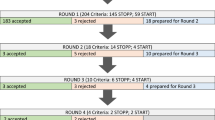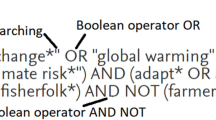Summary
Disease management involves a holistic approach in which healthcare professionals work together to effect an optimal outcome for a particular patient with a particular disease. The environment needed for optimal disease management programmes includes a multidisciplinary culture of cooperation, communication and coordination, a clinical champion, an administrative champion, enough time to do disease management correctly, enough support to do it right, computerised information systems, examination of the total patient continuum and not component management, and use of multiple sites to obtain bigger sample sizes. Disease management goes beyond outcomes research, it goes beyond guidelines development, and it goes beyond randomised controlled trials (RCTs).
Similar content being viewed by others
References
Horn SD, Hopkins DSP. Clinical practice improvement: a new technology for developing cost-effective quality care. New York: Faulkner & Gray, 1994
Kellie SE, Kelly JY. Medicare Peer Review Organization pre-procedure review criteria. JAMA 1991; 265(10): 1265–70
Audet AM, Greenfield S, Field M. Medical practice guidelines: current activities and future directions. Ann Intern Med 1990; 113(9): 709–14
Leape LL, Park RE, Kahan JP, et al. Group judgments of appropriateness: the effect of panel composition. Qual Assur Health Care 1992; 4(2): 151–9
Park RE, Fink A, Brook RH, et al. Physician ratings of appropriate indications for three procedures: theoretical indications vs. indications used in practice. Am J Public Health 1989; 79(4): 445–7
Eddy DM. A manual for assessing health practices and designing practice policies. Philadelphia: The American College of Physicians, 1992
Eddy DM. Variations in physician practice: the role of uncertainty. Health Aff (Millwood) 1984; 3: 74–89
Horn SD. CPI: improving quality and decreasing cost in managed care. Med Interface 1995 Jul; 60–70
Horn SD, Sharkey PD, Levy R. A managed care pharmacoeconomic research model based on the Managed Care Outcomes Project. J Pharm Pract 1995; 8(4): 172–7
Horn SD, Sharkey PD, Tracey DM, et al. Intended and unintended consequences of HMO cost containment strategies: results from the Managed Care Outcomes Project. Am J Managed Care 1996 Mar; 2: 253–64
Horn SD, Sharkey, PD, Gassaway J. Managed Care Outcomes Project: study design, baseline patient characteristics, and outcome measures. Am J Managed Care 1996 Mar; 2: 237–47
Horn SD, Buckle JM, Carver CM. The Ambulatory Severity Index: development of an ambulatory case mix system. J Ambulatory Care Manage 1988; 11: 53–62
Horn SD, Sharkey PD, Buckle JM, et al. The relationship between severity of illness and hospital length of stay and mortality. Med Care 1991; 29: 305–17
Averill RF, McGuire TE, Manning BE, et al. A study of the relationship between severity of illness and hospital cost in New Jersey hospitals. Health Serv Res 1992; 27(5): 587–617
Iezzoni LI. Risk adjustment for measuring health care outcomes. Ann Arbor (MI): Health Administration Press, 1994
Author information
Authors and Affiliations
Corresponding author
Additional information
About the Author: Susan D. Horn, Ph.D., is Senior Scientist, Institute for Clinical Outcomes Research, and Professor in the Department of Medical Informatics, University of Utah School of Medicine, Salt Lake City, Utah. She is involved in various CPI research studies with hospital, long term care, and ambulatory patients.
Rights and permissions
About this article
Cite this article
Horn, S.D. Tools and Techniques in Disease Management. Dis-Manage-Health-Outcomes 1, 17–25 (1997). https://doi.org/10.2165/00115677-199701010-00004
Published:
Issue Date:
DOI: https://doi.org/10.2165/00115677-199701010-00004




